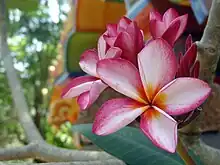frangipani
English

Plumeria rubra flowers

Plumeria rubra tree
Alternative forms
Etymology
From French frangipane, from Italian frangipane. Possibly named after Muzio Frangipane, a 16th-century marquess of the Italian noble Frangipani family, who invented a plumeria-scented perfume. The name Frangipane derives from frangere (“to break”) + pane (“bread”), a reference to the family's distribution of bread in time of famine.
Pronunciation
- IPA(key): /ˌfrænd͡ʒɪˈpɑːnɪ/, /ˌfrænd͡ʒɪˈpænɪ/
Noun
frangipani (countable and uncountable, plural frangipanis or frangipani)
- Any of several tropical American shrubs and trees of the genus Plumeria, having fragrant, showy, funnel-shaped flowers of a wide range of colours from creamy to red.
- Synonym: plumeria
- 2022 November 26, Virginia Feito, “Sweating Through a Honeymoon in Paradise”, in The New York Times:
- I casually let this information drop as our concierge drives us through the resort in a buggy, a frangipani flower tucked behind his ear. He promises to fix the bug problem and drops us off at the lobby.
- A perfume obtained from this plant or imitating the odour of its flowers.
- Alternative form of frangipane (“cream made from ground almonds; pastry filled with this cream”).
- 2010 November 24, Amanda Hesser, “Recipe Redux: Fyrstekake (Royal Cake), 1963”, in The New York Times Magazine:
- Lahlou baked a cardamom frangipani and cut it into pieces as a base for roasted chicken. (Well, I used chicken; he used squab. Use whatever bird you fancy.) Then he topped the frangipani and poultry with kale and leaf-thin sugar-and-cardamom-sprinkled phyllo rectangles — made by baking them between baking sheets — like a savory mille-feuille.
Derived terms
Related terms
Translations
any of several tropical American shrubs and trees of the genus Plumeria
|
Further reading
- “frangipani”, in Dictionary.com Unabridged, Dictionary.com, LLC, 1995–present.
This article is issued from Wiktionary. The text is licensed under Creative Commons - Attribution - Sharealike. Additional terms may apply for the media files.